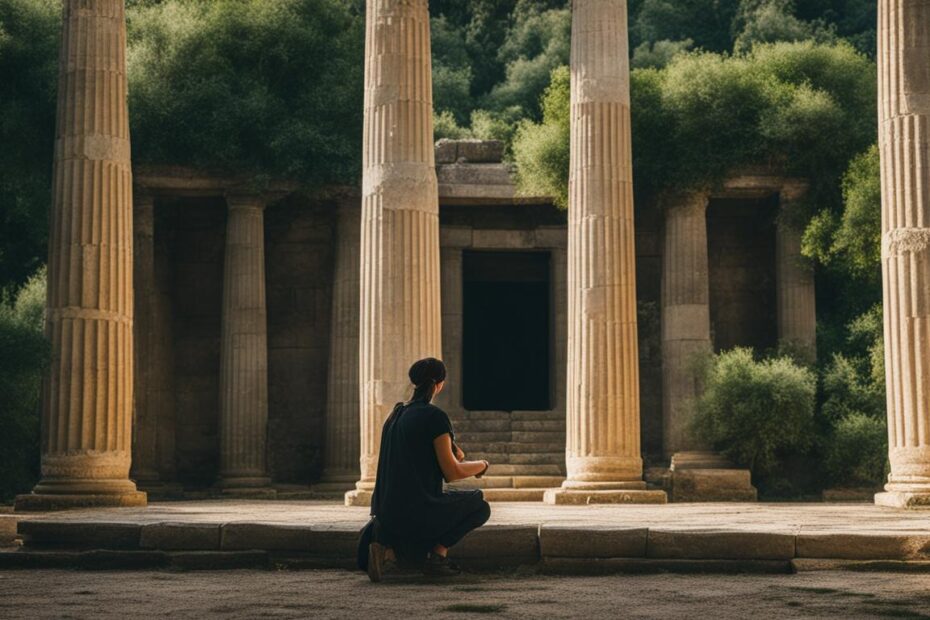In Greek culture, the act of supplication holds deep significance and serves as a powerful means of connecting with the divine. Supplication, translated as “παράκληση” (paráklisi) in Greek, refers to an earnest entreaty or prayer, often seeking guidance or help. It is a vital aspect of worship and has been practiced since ancient times.
Supplication in Greek culture is not merely a ritual, but a heartfelt expression of faith and a way to seek divine intervention. By understanding the meaning and rituals associated with supplication, one can delve deeper into the power of prayer and the enduring spirituality of Greek traditions.
Key Takeaways:
- Supplication, translated as “παράκληση” (paráklisi) in Greek, refers to an earnest prayer or entreaty.
- Supplication has great importance in Greek culture and religion, serving as a way to connect with the divine.
- Ancient Greeks believed that through supplication, they could gain favor and protection from the gods.
- Supplication in Greek mythology often symbolizes invoking divine intervention or mercy.
- In modern Greek society, supplication continues to play a role, particularly within the Greek Orthodox Church.
The Importance of Supplication in Greek Culture and Religion
Supplication holds great importance in Greek culture and religion. In ancient Greece, supplication was an integral part of religious rituals and ceremonies. It was a way for individuals to connect with the divine and seek assistance from the gods. Supplication was also used as a form of public prayer during times of crisis or calamity. Greeks believed that through supplication, they could gain favor and protection from the gods, ensuring spiritual and physical well-being. The act of supplication in Greek culture was deeply rooted in the belief that the gods had the power to intervene in human affairs and influence outcomes.
Supplication in Greek culture was not simply a passive act of obedience, but a sincere expression of trust and humility. By engaging in supplication, Greeks acknowledged their reliance on the gods and their belief in the interconnectedness of the mortal and divine realms. It was a way to seek divine guidance, express gratitude, and cultivate a sense of awe and reverence for the gods. The significance of supplication went beyond individual needs; it played a crucial role in the cohesion and well-being of the entire community.
The act of supplication was not confined to formal religious settings. It permeated various aspects of Greek society, from private households to public gatherings. Supplication was seen as a powerful tool for invoking divine intervention and bringing about positive outcomes in all aspects of life, including matters of personal relationships, health, fertility, and prosperity. The belief in the efficacy of supplication was deeply ingrained in Greek culture, and its importance continued to shape the lives of the people, even in modern times.
The Rituals and Practices of Supplication in Ancient Greece
Supplication in ancient Greece was accompanied by specific rituals and practices that added depth and meaning to the act of prayer. Individuals seeking divine intervention or guidance would first approach a sacred site or temple dedicated to the deity they wished to supplicate. These sites served as physical symbols of the gods’ presence and power, creating a sacred atmosphere for the supplicant.
Upon arrival, the supplicant would present offerings as a sign of respect and devotion. These offerings could range from simple items such as flowers or incense to more elaborate tokens representing their desires or requests. The act of offering these gifts expressed the supplicant’s sincerity and commitment to their prayer.
Once the offerings were made, the supplicant would then kneel and raise their hands in a gesture of supplication. This physical posture symbolized humility and reverence towards the gods. With their hands extended, the supplicant would fervently pray, expressing their needs, desires, or seeking divine guidance. Chants or hymns were often recited during supplication, further enhancing the spiritual atmosphere and creating a sense of collective devotion.

The rituals and practices of supplication in ancient Greece were deeply ingrained in the culture and tradition of the time. They represented a profound belief in the gods’ ability to answer prayers and intervene in human affairs. Supplication was not merely a casual request; it was a solemn act of devotion and trust, demonstrating the supplicant’s faith in the gods’ benevolence and power.
The Symbolism and Power of Supplication in Greek Mythology
In Greek mythology, supplication carries profound symbolism and is imbued with great power. Ancient Greek myths often depict supplication as a means of invoking divine intervention or mercy. It is a humble act that acknowledges human vulnerability and seeks assistance from the powerful deities who reside atop Mount Olympus. Supplication in Greek mythology represents a sincere plea for the gods’ compassion and help, emphasizing the belief that they can be moved by human suffering.
“With hands uplifted I made my prayer, and challenged him who stood beside the altar to answer me.”
Supplication plays a crucial role in several Greek legends. In the epic tale of Odysseus, for example, the protagonist frequently resorts to supplication when faced with adversity during his long journey home. In the myth of King Midas, the desperate king begs the god Dionysus to relieve him of his cursed golden touch. These stories illustrate how supplication serves as a powerful tool for mortals to seek divine assistance in times of exceptional need.
Supplication in Ancient Greek Myths
In ancient Greek myths, supplication serves as a narrative device that underscores the interplay between mortals and gods. It highlights the idea that while humans may possess courage and intelligence, they ultimately rely on the mercy and favor of the divine. The gods, in turn, are portrayed as entities who possess immense power and influence over mortal lives. Supplication creates a dynamic relationship between mortals and gods, wherein humans express their humility and dependence on the divine, while the gods demonstrate their ability to shape the course of human events.
The power of supplication in Greek legends lies not only in the potential for divine intervention but also in the emotional and psychological impact it has on individuals. By engaging in supplication, mortals find solace, hope, and a sense of connection with the gods. It is a way for them to express their deepest desires, fears, and vulnerabilities, ultimately fostering a profound spiritual connection with the divine realm. Through supplication, mortals can transcend their mortal limitations and tap into a higher power that can guide, protect, and transform their lives.

| Myth | Key Supplication Scene |
|---|---|
| The Odyssey | Odysseus’ supplication to the god Poseidon for safe passage home. |
| King Midas | King Midas’ supplication to the god Dionysus to undo the golden touch curse. |
| The Labors of Hercules | Hercules’ supplication to various gods for guidance and aid during his twelve labors. |
| Prometheus Bound | Prometheus’ supplication to the gods for release from his torment. |
Supplication in Modern Greek Society and Religion
In modern Greek society, supplication continues to hold a significant role, particularly within the Greek Orthodox Church. This ancient practice remains a fundamental aspect of Greek culture and serves as a powerful means of connecting with the divine and seeking spiritual guidance. The act of supplication allows individuals to express their deepest desires, fears, and hopes, while finding solace and strength in their faith.
Within the Greek Orthodox Church, supplication takes various forms and is seen as a vital part of religious devotion. Individuals often visit churches, light candles, and offer prayers of supplication for personal or communal needs. This act of reaching out to the divine expresses a profound belief in the power of prayer and the intercession of saints and angels.
Contemporary practices of supplication in Greece showcase the enduring spirituality of the Greek people. It is customary to witness individuals passionately engaging in supplication, earnestly seeking divine intervention in times of joy, sorrow, and uncertainty. This act of devotion serves as a reminder of the unbroken connection between the mortal and the divine, and the enduring strength of Greek traditions.
The Role of Supplication in the Greek Orthodox Church
Supplication plays an essential role in the Greek Orthodox Church, a prominent religious institution in Greece. The church recognizes supplication as a profound expression of faith and a way to seek guidance and help from God. Greek Orthodox Christians often engage in supplication through the lighting of candles and offering prayers in churches or at holy sites.
“Through supplication, we humbly seek the intercession of saints and angels, believing in their ability to carry our prayers to God. It is a powerful way to connect with the divine and find solace in our moments of need.” – Greek Orthodox Priest
Contemporary Practices of Supplication in Greece
In modern Greek society, supplication remains a strong and deeply rooted practice. It is common to see individuals visiting churches or monasteries, fervently praying and offering supplications for various intentions, such as healing, protection, or guidance. These acts of devotion demonstrate the enduring belief in the power of supplication to move the hearts of the divine and bring about positive change.
Supplication in modern Greek society holds a special place during significant religious events and celebrations. The faithful gather in large numbers, offering supplications and prayers collectively, reinforcing a sense of unity and shared belief. This collective act of supplication underscores the importance of community and faith in Greek culture.
Summary
- Supplication remains a significant practice in modern Greek society, particularly within the Greek Orthodox Church.
- Supplication allows individuals to connect with the divine and seek spiritual guidance.
- Contemporary practices of supplication include lighting candles and offering prayers in churches or at holy sites.
- Supplication serves as a powerful expression of faith and a way to seek intercession from saints and angels.
- In Greece, supplication is seen as a means of finding solace, strength, and unity within the community.
Conclusion
Supplication in Greek culture holds profound meaning and significance. The Greek word for supplication is “παράκληση” (paráklisi), which refers to an act of prayer or earnest entreaty. It serves as a bridge between the mortal and the divine, allowing individuals to express their deepest desires, seek divine intervention, and find solace and guidance in times of need.
The rituals and practices associated with supplication in ancient Greece were deeply rooted in the belief that the gods had the power to influence human affairs. Individuals would approach sacred sites or temples, presenting offerings as a sign of respect and devotion. They would kneel, raise their hands in supplication, and fervently pray to the gods, accompanied by chants or hymns.
Supplication also has symbolical and powerful significance in Greek mythology. Many ancient Greek myths depict the act of supplication as a means of invoking divine intervention or mercy. Heroes and mortals turned to supplication when faced with challenges or danger, acknowledging their vulnerability and pleading for assistance from powerful deities.
In modern Greek society, supplication continues to play a role, particularly within the Greek Orthodox Church. It serves as a powerful expression of faith and reliance on the divine. Individuals visit churches, light candles, and offer prayers of supplication for personal or communal needs.
Understanding the meaning and rituals associated with supplication in Greek culture provides a deeper understanding of the power of prayer and the enduring spirituality of Greek traditions. Whether in ancient times or the present day, supplication remains a transformative act of faith, allowing individuals to connect with the divine and seek spiritual guidance.
FAQ
What is the Greek word for supplication?
The Greek word for supplication is “παράκληση” (paráklisi).
How is supplication defined in Greek?
In Greek, supplication refers to an act of prayer or earnest entreaty.
What is the significance of supplication in Greek culture and religion?
Supplication holds great importance in Greek culture and religion as a way to connect with the divine and seek assistance from the gods.
What were the rituals and practices of supplication in ancient Greece?
In ancient Greece, individuals would approach sacred sites or temples, present offerings, kneel, raise their hands, and pray fervently to the gods as part of supplication.
What is the symbolism and power of supplication in Greek mythology?
Supplication is often portrayed in Greek mythology as a means of invoking divine intervention or mercy in times of need.
Does supplication still play a role in modern Greek society and religion?
Yes, supplication continues to be practiced in modern Greek society and religion, particularly within the Greek Orthodox Church.
How does supplication serve as a bridge between the mortal and the divine?
Supplication allows individuals to express their deepest desires, seek divine intervention, and find solace and guidance in times of need, bridging the gap between the mortal and the divine.









